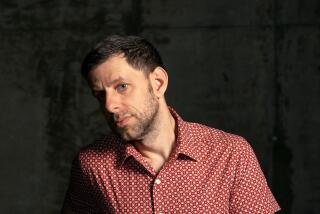METâS TOZZI OFFERS INSIGHTS ON ARIAS
Metropolitan Opera bass-baritone Giorgio Tozzi wanted to put a dozen nervous young singers immediately at ease.
âI am probably one of the best audiences youâll ever have,â he announced at the beginning of a workshop he conducted one recent evening at the Orange campus of Loyola Marymount University.
âI really enjoy hearing people sing, and I donât believe in being negative. Remember, you have a friend out here.â
Looking tanned and dapper in a three-piece gray suit, Tozzi, 63, was conducting a workshop entitled âMake the Most of Your Ariaâ as part of the Festival of Learning and Performing, founded by Susan Brenner and held annually at various locations in the county since 1980. The festival will conclude Sunday with conductor Henry Holt leading workshops on âAudition Ariasâ at 1:30 and 7 p.m. at the Orange campus. (Cost for each workshop is $7.)
The participants from throughout the Southland that attended the workshop ranged in age and experience, but Tozzi said he felt âan ability to empathize with them all.â
âI can almost feel what they experience, and that cues me in,â he explained during a break in the four-hour session.
Born in Chicago in 1923, Tozzi sang with the Metropolitan Opera in New York for more than 20 years. His repertory included title roles in âDon Giovanni,â âBoris Godunovâ and âLe Nozze di Figaro,â and he created the role of the doctor in the premiere of Barberâs âVanessaâ at the Metropolitan in 1958. Tozzi, who also was active in films, television and musical comedy, won critical praise for his musical intelligence, warmth and versatility.
As a teacher, Tozzi compares his approach to a tailor who âmakes a study to suit the needs, personality and physical state of the person heâs making a suit for.â
âNot everybody is coming from the same place, so you need to be aware of many, many unknowns and variables,â he said.
His method, he explained, was to pick on âessentialsâ rather than âfussing about on details.â
For instance, for a singer who had chosen an aria from Rachmaninoffâs âAleko,â the problem was getting in expressive sync with the piano accompaniment.
âI donât feel youâre part and parcel of what I hear in the (agitated) accompaniment,â Tozzi said. âSo when you have rests, sing the accompaniment inside yourself, in your mind.â
For emphasis, Tozzi turned to the piano and lifted the lid.
âYouâre doing a musical duet with this instrument,â he said. âYouâre not doing a solo with accompaniment. This is a duet.â
But for the tenor who chose âUna furtiva lagrimaâ from Donizettiâs âLâElisir dâAmore,â Tozzi pointed out that âthe accompaniment is a trap.
âIt sounds doleful. But the whole character of the piece is different from what the accompaniment leads you to. There is hope, joy. You realize that (the heroine Adina) loves you. So you can depart a little from that pained expression.â
Tozzi tried to emphasize the drama of a situation for the baritone who had selected âDi Provenza il marâ from Verdiâs âLa Traviata.â
âWalk toward me slowly on each phrase,â he said. âYou are not pleading or begging. Youâre a father making an appeal to reason. You ask your son: âHow could you forget your home, the countryside you grew up in? And for what?â
âSo tell me. Make a real point.â
But above all, Tozzi emphasized that opera is written for large theaters. Of the participantsâ efforts he later said: âIndividual problems varied, but the common element was that most are used to singing in small rooms. Their teachers tend to forget that they will be singing in a theater that holds 2,000 to 3,000 people.
âSo they need to start relating to a larger environment, to project in order to communicate to the audience.â
Soprano Sharon Lynn Keys found Tozziâs suggestions âeasy to understand and incorporate.â
âActually, it was a relief because they made an immediate difference and made it easier to sing,â she said.
âThis is a unique situation, and itâs hard on you mentally. But itâs been very useful.â
But above all, Tozziâs goal is âto help a person acquire a discipline and cultivate it from within.
âThe singers must find their own independence,â he said, âbecause when the curtain goes up, they are out there alone. I canât be on stage to hold their hand.â
More to Read
The biggest entertainment stories
Get our big stories about Hollywood, film, television, music, arts, culture and more right in your inbox as soon as they publish.
You may occasionally receive promotional content from the Los Angeles Times.










